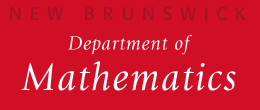The M.S. degree has two options:
-
Mathematical Finance option (M.S.M.F.).
This program provides specific training
in mathematics that prepares the degree recipient for a career in the
mathematical finance industry. The administration of this program is
largely separate from the main graduate program.
Further information about the Mathematical Finance Option - Traditional option.
This is a general program in mathematics consisting of 30 credits (10
courses), a Master's essay and comprehensive examination.
Degree requirements for the M.S. - traditional option
This page is intended for students who are considering applying for the traditional option of the M.S. program.
For the reasons given below, few students enroll in the traditional option for the M.S. If you are interested in enrolling in the Traditional M.S. program, you should read this page carefully and then write to the graduate director (grad-director@math.rutgers.edu), explaining why you believe that your circumstances would make you appropriate for our program (make reference to the points discussed below).
- Our graduate program (aside from the M.S.M.F. program) is focused around its Ph.D. program. Most M.S. degrees are awarded to students who originally enrolled in the Ph.D. program, but leave the program before completion. Such students are eligible for an M.S. if they have completed the requirements.
- At any given time we usually have only one or two students enrolled in the traditional M.S. program.
- While we provide financial support to our Ph.D. students, such support is not normally available to M.S. students.
- Since nearly all of our students (outside of the M.S.M.F. program) are full-time students, our courses are scheduled during the day, making it difficult for part-time students to take many courses.
- Aside from the courses specifically for the M.S.M.F. program, and a few courses that are run for graduate engineering students, our courses are designed for our Ph.D. program and are pitched at a higher level than courses at some other universities that are geared for a larger Master's program. Master's level students often encounter difficulty with our basic Ph.D. courses. To be successful in our basic graduate courses, students need a strong undergraduate mathematics background, which normally means having taken and performed very well in various advanced undergraduate courses. Students have the option to take some undergraduate courses first to improve their preparation.
- There are many other universities that offer Master's programs that have a substantial number of Master's students and (a) are able to provide courses whose level is more appropriate for a Master's student, and (b) are able to provide teaching assistantships to Master's students.
- At some universities, the Master's program provides an alternative avenue for admission to the Ph.D. program for students who are not admitted to the Ph.D. program. In principle, this could be the case here, but in practice, in recent years no student has moved from the Master's program into the Ph.D. program.
For all of these reasons, we rarely admit students to our traditional M.S. program and rarely advise students to join our program. Still, we do occasionally enroll traditional M.S. students. Students who do join our program typically have the following circumstances:
- The student has reasons for wanting to be in our geographic area.
- The student has independent means of financial support.
- The student understands that they may have to start with some advanced undergraduate courses. If this is required, the student understands that they will need to do very well in these courses to be adequately prepared for the graduate courses.
- The student understands that successful completion of the Master's degree does not entitle them to admission to the Ph.D. program.
Students who are interested in the traditional M.S. program are usually not admitted directly into our program. The usual procedure for joining the traditional M.S. program is to take some courses through the non-degree study program. This will help the student improve their preparation for mathematics graduate study, and also help the student and us to assess whether they are prepared for our program.
Because admission to the program is so infrequent, there are no well-defined standards for admission. As stated at the beginning of this page, students who are interested in enrolling in the traditional M.S. program should write to the graduate director (grad-director@math.rutgers.edu), explaining why you believe that your circumstances would make you appropriate for our program (make reference to the points discussed above).
For students whose ultimate goal is a Ph.D. in Mathematics. The first thing you should know is that in the United States, most Ph.D. programs in Mathematics at research-oriented universities such as Rutgers accept students into the Ph.D. program with a Bachelor's degree, This contrasts with some other fields, such as in Engineering, where it is common for students to obtain a Master's degree first. If you have a strong undergraduate background in mathematics, and are aiming to get a Ph.D. you should normally apply directly to a Ph.D. program.
What if you don't have a strong undergraduate background in mathematics? In this case, you may want to enroll in a Master's program in order to obtain this background. For the reasons discussed above, you will probably want to select a program other than ours. In selecting a program, you may want to find out how successful students from the program are in subsequently gaining admission to a Ph.D. program. Also, in planning your course work, you should consult an advisor to select courses that further your goal of preparing for Ph.D. work (not all courses designated as Master's level are useful for this purpose).








